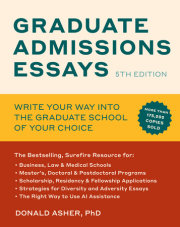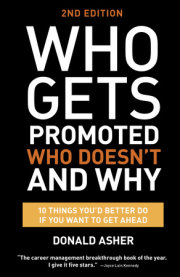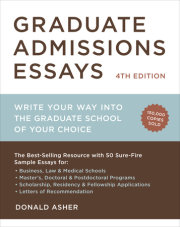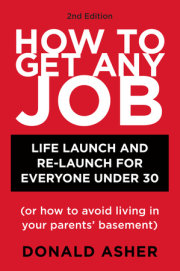Introduction
How to Use This Book The best way to use this book is to read it in its entirety, even the sections that do not apply to you directly. Then start over, completing each assignment before you go on to the next. Plan on rewriting your essay several times. Whatever you do, do not write a word until you have done the personal assessments in chapter 5, Getting Ready to Write.
If you have procrastinated until the last minute, the first thing you need to do is relax. You can still finish a good essay by tomorrow morning. Just read chapters 5, 7, and 8 in order and follow the assignments as you come across them. Do not read ahead. If any sections do not apply to your particular case, just skip them.
This book makes only one assumption about you, the reader. Readers in general tend to be much smarter than the average human; given this book’s topic, it is probably safe to assume that you are much smarter than the average reader. Incidentally, after years of having college professors focus on your errors and shortcomings, you are probably a lot smarter than you think. It is a luxury for an author to be able to write for such an audience.
This book presents a variety of techniques that students use to gain admission to highly competitive graduate programs. Some are so competitive that only 2 percent of applicants are accepted; for every fifty students who apply, only one will be entering the program. Even if your targeted schools are relatively easy to get into, these techniques should be of interest to you in winning scholarships, assistantships, and other valuable considerations. Pay particular attention to the strategies for contacting professors and overcoming liabilities in your background, and you’ll be able to gain admission to more competitive programs than you otherwise might.
One of the unique features of this book is its inclusion of a full chapter on letters of recommendation (chapter 10). Letters of recommendation are a critical component of your application process, and they deserve full and separate consideration. In addition to providing a plan for selecting and motivating writers of these letters, the chapter provides a handout you can give them—“Better Letters of Recommendation”—to guide them through the process. See pages 234–235.
Another unique feature is the inclusion of diversity and adversity, scholarship, residency, fellowship, postgraduate, and postdoctoral essays. This information was available in no other book at the time this edition went to press. As one proceeds up the ivory tower, essays become more precise, more specific, and less personal, in a seamless continuum. Reading these samples will help you see your own in the larger context of academic essay and proposal writing.
This book’s goal is to take all of the mystery and most of the stress out of the graduate applications process and guide you through drafting a compelling graduate admissions essay. This is also a resource book, with recommendations for supplementary reading, websites, and other materials throughout the text. I have included information on financial aid, graduate admissions testing, and other aspects of the graduate admissions process to give you a clearer picture of the graduate essay as an integral part of the entire application process. You should also seek the advice of other guides that focus exclusively on these topics.
This book is not intended to replace the advice of professors, college career counselors, and undergraduate advising officers. On the contrary, this guide is meant to encourage you to
visit them as early as possible, and with more knowledge than you would otherwise have possessed, so that you can be a more intelligent user of their services. Spend time learning the mechanics from this book, and you can devote more of your time with advisors to true counseling.
Over the years students have made two complaints about the early editions of this book: too many of the examples are from people with unusual backgrounds, and I advocate that the student do too much work to apply to graduate school (surely, they plead, there must be an easier way). For example, one grad applicant wrote:
The purpose of your book should be to help the graduate student who isn’t from Russia and taking theoretical physics, hasn’t set up an educational program at Yale, hasn’t overcome severe hardships because he’s a refugee, etc. If I had something like this, I probably wouldn’t need your book. Please keep in mind, for your next edition, the essays of the more ordinary students like me. We can’t all run away with the carnival. In response, I have included more essay samples from regular students; that is, students of traditional graduate school age, with traditional academic experience. Nevertheless, you will note that these too are unusual students: they are unusually well prepared, unusually thoughtful, unusually well directed, unusually well-read in their chosen fields. Further, it is my contention that all students are unusual in one way or another; the prewriting exercises in chapter 5 will help you discover how you differ from the background noise of common applicants.
As to the amount of work involved, it is important to remember that this is a book about gaining admission to
highly competitive graduate programs. It has been my goal to find out what the students who are admitted to these programs do differently from the students who are not admitted. This book is the answer.
As you read, remember that this is, to some extent, a study of the ideal way to apply. You needn’t do all this if you are not applying to highly competitive programs, or you have some safety schools on your list, or you have a backup plan, or you are just too darn busy. Take the tips and pointers that you can, that make sense to you, and do not worry about the rest. This is a guide, not a recipe that you must slavishly follow. Adjust it to suit your particular needs, and let it improve the job you do in applying to graduate school.
While you cannot change who you are and what you have done with your life so far, you can make a good graduate application. Students are not always able to accurately estimate their academic value. The number of students fully qualified for graduate study far exceeds the number who actually apply. To the extent that this book facilitates your application and contributes to the realization of your potential, so let it be judged.
Copyright © 2024 by Donald Asher. All rights reserved. No part of this excerpt may be reproduced or reprinted without permission in writing from the publisher.














